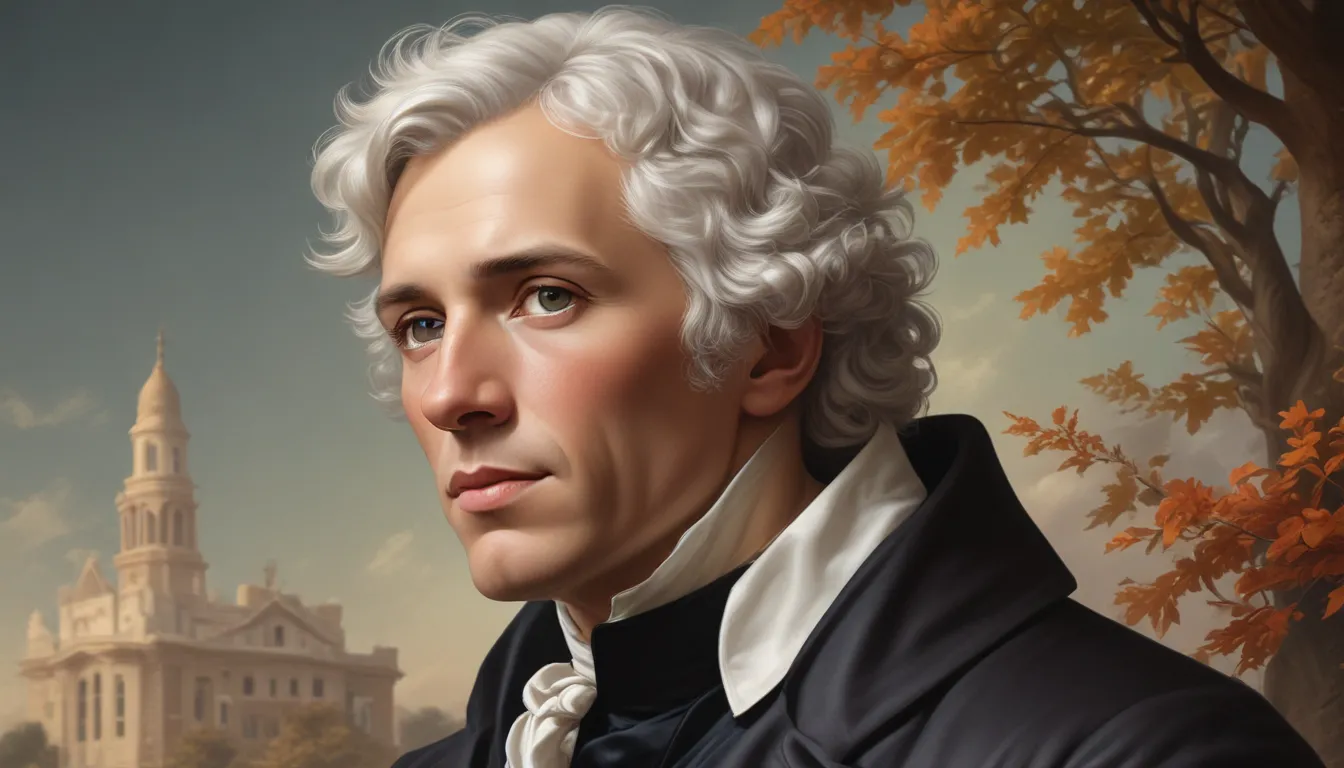The images in our articles may not match the content exactly. They are used to grab your attention, not to show the exact details in the text. The images complement the text but do not replace it.
Have you ever wondered about the influential minds that shaped early American thought? Jonathan Edwards, a preacher, philosopher, and theologian, emerges as a pivotal figure in the 18th century, leaving a profound impact on religious, philosophical, and cultural landscapes. Beyond his public persona, there lies a man with a rich tapestry of experiences and beliefs. Let’s delve into 16 intriguing facts about Jonathan Edwards that offer a glimpse into the life of this remarkable historical figure, where faith and intellect intertwine in unexpected ways.
Jonathan Edwards: A Brief Overview
Jonathan Edwards, born on October 5, 1703, in East Windsor, Connecticut, was not just a preacher but also a theologian and missionary to Native Americans. His significant influence during the First Great Awakening, a period of religious revival in the American colonies, solidified his place in American history. Edwards’s fiery sermons emphasized divine wrath and the beauty of God’s sovereignty, laying the groundwork for American Protestant beliefs.
- Early Academic Success: Edwards’s intellectual prowess was evident from a young age. He entered Yale College before his 13th birthday and graduated as valedictorian of his class at the age of 17.
The Philosophical Mind of Jonathan Edwards
While primarily known for his sermons, Edwards was also a deep thinker whose ideas on beauty, reality, and ethics continue to shape American thought.
-
Emphasis on Personal Experience: Edwards believed in the importance of personal religious experience, asserting that true religion was a matter of the heart, not just intellectual assent.
-
Significant Works: His treatise “Freedom of the Will” remains a cornerstone in Reformed theology, arguing that human will is determined by the greatest desire yet remains compatible with divine sovereignty.
The Impact of the Great Awakening
During the Great Awakening, Edwards used his sermons to ignite spiritual fervor among his listeners, playing a pivotal role in the revival.
-
Iconic Sermon: “Sinners in the Hands of an Angry God,” one of Edwards’s most famous sermons, vividly describes Hell and the consequences awaiting the unrepentant.
-
Revival in Northampton: Edwards spearheaded a significant revival in Northampton, Massachusetts, leading to a surge in religious conversions and spiritual awakening.
The Enduring Legacy of Jonathan Edwards
Despite facing challenges and criticism during his lifetime, Edwards’s influence on American religion and philosophy remains profound.
-
Commitment to Missionary Work: Edwards served as a missionary to Native Americans in Stockbridge, Massachusetts, demonstrating his dedication to spreading his religious beliefs.
-
Legacy at Princeton: Although his tenure as president of the College of New Jersey (later Princeton University) was short-lived due to his sudden death from a smallpox inoculation, Edwards’s writings continue to be studied for their theological and philosophical insights.
Personal Life and Tragedy
Edwards’s personal life was marked by moments of joy and profound sorrow, reflecting the complexities of colonial American existence.
-
Marriage and Family: He married Sarah Pierpont in 1727, and together they had eleven children, fostering an environment of intellectual and spiritual discourse.
-
Tragic Loss: Sadly, Edwards experienced the deaths of three of his children during his lifetime, a sobering reminder of the harsh realities of 18th-century life.
The Controversy Surrounding Slavery
Addressing the contentious issue of slavery, Edwards’s ownership of slaves has sparked debates among historians and theologians about his legacy.
- Evolving Perspectives: Despite owning slaves, Edwards’s writings suggest a potential shift in his views on slavery, indicating a growing recognition of its inconsistency with Christian teachings.
Continuing Influence on Modern Christianity
Edwards’s theological ideas have left a lasting imprint on Christianity, particularly within Reformed and evangelical circles.
-
Emphasis on Personal Faith: His focus on establishing a personal relationship with God and the experience of conversion has influenced evangelical Christianity’s emphasis on individual faith experiences.
-
Enduring Legacy: The ongoing popularity of his writings and the respect accorded to him as a theologian and philosopher underscore Edwards’s enduring influence on American religious thought.
Reflecting on Jonathan Edwards’s Legacy
Jonathan Edwards’s enduring legacy serves as an inspiration to delve deeper into our own beliefs with rigor and passion, exploring the intersection of faith and intellect.
As we examine the life and works of Jonathan Edwards, we are reminded of the profound impact one individual can have on shaping religious thought, cultural landscapes, and philosophical discourse. By unraveling the complexities of his beliefs, experiences, and contributions, we uncover timeless insights into human nature, divine grace, and the pursuit of spiritual enlightenment. Jonathan Edwards’s story challenges us to embark on our own quest for truth and understanding, following in his footsteps of unwavering dedication to faith and intellect.
Dive Deeper: Frequently Asked Questions
Q: Who was Jonathan Edwards?
A: Jonathan Edwards was a prominent preacher, theologian, and missionary known for his pivotal role in shaping early American religious thought during the 18th century.
Q: What made Jonathan Edwards famous?
A: Edwards gained fame for his compelling sermon “Sinners in the Hands of an Angry God,” delivered in 1741, which vividly depicted Puritan beliefs in a persuasive manner.
Q: Did Jonathan Edwards have notable beliefs or teachings?
A: Absolutely! Edwards strongly advocated for predestination and emphasized the significance of a personal, emotional connection to religious faith, highlighting the journey of salvation as a profound and individual experience.
Q: How did Jonathan Edwards contribute to the Great Awakening?
A: Edwards’s dynamic preaching during the Great Awakening sparked religious revival by encouraging direct, personal experiences of God’s grace, leading to widespread conversion and spiritual awakening.
Q: Was Jonathan Edwards involved in any controversies?
A: Edwards’s tenure was marked by controversies, particularly regarding his views on predestination and church membership standards, which ultimately led to his dismissal from his congregation and stirred debate and division.
Q: How has Jonathan Edwards’s legacy endured over time?
A: Through his extensive writings, sermons, and philosophical inquiries, Edwards’s legacy continues to be studied and appreciated for its theological and historical significance in shaping American religious thought and intellectual discourse.
Q: What impact did Jonathan Edwards have outside of religion?
A: Edwards’s contributions extend beyond religious realms, influencing American culture, philosophy, and early intellectual foundations, making him a figure of interest across various fields of study.
Conclusion
In the legacy of Jonathan Edwards, we find a compelling narrative of faith and intellect intertwined, shaping American thought and challenging conventional beliefs. Through his profound sermons, philosophical inquiries, and personal experiences, Edwards invites us to explore the depths of our own convictions and seek truths that resonate across generations. As we contemplate the enduring influence of this remarkable figure, we are reminded of the power of relentless pursuit of knowledge, unwavering dedication to faith, and the transformative impact one individual can have on the course of history.
Your Feedback Matters!
At the heart of our commitment to delivering trustworthy and engaging content lies a dedication to your insights and contributions. Each fact shared on our platform undergoes rigorous review by our team of editors to ensure accurate, credible, and compelling information. Trust in our commitment to quality and authenticity as we continue to explore, learn, and discover together. Thank you for being a part of our journey in uncovering fascinating facts and enriching experiences.






